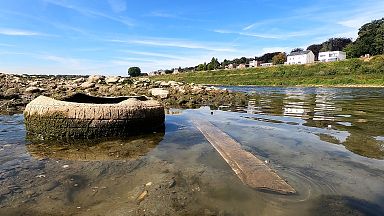LIVES, a pioneering European project, is tackling the massive problem of plastic in cross-border rivers and streams. So far a staggering 260 tons of waste has been removed.
In recent years there has been increasing awareness regarding the amount of plastic finding its way into our oceans. But there is also the problem of plastic waste being found in our river systems, which in turn can eventually find its way into the sea.
 ADVERTISEMENT
ADVERTISEMENT
 ADVERTISEMENT
ADVERTISEMENT
One way of tackling this growing issue is a pioneering new project set up by the EU, called LIVES: Litter Free Rivers and Streams, that tackles the problem of plastic in cross-border rivers and streams, through joint action. Since 2018 they have collected the staggering sum of 260 tons of waste.
The total budget of LIVES is 1.5 million euros, of which 49% is financed by the European cohesion policy. The remaining 51% comes from the ten or so partners involved, including water-management organisations and universities.
One group of volunteers visits the banks of the river Meuse in Borgharen in the Netherlands every week. Although the river basin looks beautiful and peaceful from a distance, there is cause for concern beneath the surface. Their main aim is to stop the waste that accumulates on the banks of this waterway which runs through the Netherlands, Belgium and Germany.
Mapping the areas with the most waste is one of the key objectives of LIVES work, and to do this they have developed a method, which can be replicated elsewhere, in any river. Twice a year, a section of the shoreline is combed and every item found is identified, most of which are plastic, or plastic related, and then logged. The recorded data is then shared by the Meuse-Rhine Euroregion countries along with partners associated with the project. 109 different types of waste have been identified so far.
The removal of plastics from the banks is only the tip of the iceberg, as many of them end up mixed with soil or sediment and some are plastic pellets, as described by Sylvia Spierts, Project Manager and Senior Project Leader at IVN,
"Tiny nodules or plastic pellets, come from industry and we find them all the way along the Meuse. Fish think "we can eat them" because they look like food or birds can eat them, but they are not food, so they will starve from hunger."
LIVES drives awareness actions to remind people that plastic waste is a threat to biodiversity, health and the environment. Finally, the project promotes the creation of a legal framework to give rivers their "own voice". Noï Boesten, the Project Leader of "Maas Clean-up",
"We took a petition to The Hague this year. That petition protects the river better and gives the river the status of a legal person. If I could choose which rights the river would get, it would be the right to be free of pollution, the right to reproduce freely, so that's both the underwater life and the shore life; and the right to have a voice, the right to represent itself."












